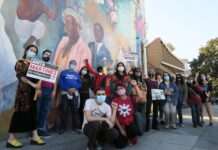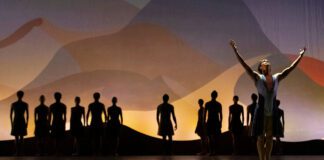by The People’s Minister of Information JR
When I was in the presence of the late great Muammar Gaddafi, almost four years ago to the day I am writing this, he told representatives from all over the African world that the African brain drain was a major issue in our communities internationally. In other words, when Black people are able to get an education, we tend to leave the nations and communities that created us for so-called greener pastures. This results in our communities remaining underdeveloped for decades although we have created some of the greatest minds in education, media, industry and politics.

Dr. Brown is a professor at Merritt College in Oakland and head of its African American Studies Department. She is an academic who understands her role in the classroom, giving young people a knowledge of self and opening fertile minds to the social realities that are oppressing their people as well.
She has been an example for present day and future academics for over a decade on how to teach history in a living way. She is planning to take a large number of students to Jamaica to learn the vast revolutionary history of this small Caribbean island.
But first they must raise half of the money to go on the trip, and the department will pay the other half. If you can financially help out with this Jamaican quest, you can email her at sbrown@peralta.edu. Check out Dr. Siri Brown in her words.
M.O.I. JR: When did you decide that you wanted to be an African American studies professor?
Dr. Brown: My first semester in college I took an African American history class and it was life changing in that it fully opened my African consciousness. I was amazed at what I was learning about the contributions of African people and, even more, I was perplexed about why I hadn’t learned any of this before.
The “why” questions sent me on a path of seeking more and more knowledge about our people and the context we have been brought into via the maafa. It was during that first semester that I said to myself, “That is what I want to do – be a part of the process of opening our people’s minds to the truth of who we are.” As your readers know, you can’t change behavior if you don’t transform identity and consciousness.
“That is what I want to do – be a part of the process of opening our people’s minds to the truth of who we are.”
M.O.I. JR: When and how did you become head of the department at Merritt College?
Dr. Brown: In this position, I stand on a strong and proud history of Black self-determination in terms of the Black Studies movement. Not many are aware that Merritt College offered the first Black history course in the country in 1964 and became the first department in 1967 – one year prior to SFSU’s Ethnic Studies Department.
Our legacy is due to the efforts of many, including Bobby Seale, a Merritt College student when he co-founded the Black Panther Party for Self Defense, and our first chair, Melvin Newton, Huey’s brother and a BPP member, and the great soldier educator Dr. Cecilia Arrington, who taught in this department for over 30 years. These people developed an outstanding curriculum and foundation to build off of.
When I saw the job posted, I knew about the history and considered it an honor to be able to continue the legacy and build the “second generation” of this department. I was hired as full-time faculty and was voted chair two years later. Being the chair is a critical position in terms of welding influence over the direction of the department, obtaining funds for projects, and protecting its legacy and Black Nationalist ideology.
Being the chair is a critical position in terms of welding influence over the direction of the department, obtaining funds for projects, and protecting its legacy and Black Nationalist ideology.
M.O.I. JR: When did you start your study abroad projects, and where have you been so far?
Dr. Brown: One of the areas I wanted to add to the department is what we call “Black Consciousness Raising Tours,” i.e. study abroad, where students engage in active learning on one of the major objectives of our department: Increasing Pan African awareness and action. What better way to learn about our people than to travel and meet and exchange.
This is a collective effort from our faculty, and we receive support from our college, the district and organizations, and businesses in the community. We particularly choose Black nations with a strong history of resistance, like Jamaica and its maroon heritage and Marcus Garvey; Ghana as the first free independent African nation and for President Nkrumah’s efforts to unite African people and produce industry; and Cuba, whose rich spiritual and literal revolutionary history serve as learning examples for expanding our understanding of resistance, the depth of African culture, Black nationalism and more.
What better way to learn about our people than to travel and meet and exchange.
We have also taken students to Kemet, Panama, Belize and, next summer, 2016, we are going to Haiti with the Haiti Action Committee. The students who we select are selected because they have taken our classes, are active in the campus or broader community, and have never been able to leave the country before.
As a matter of fact, many of our students have never left Oakland. And as much as we love Oakland, we know how important it is to explain our understanding of the work generally and the African world particularly.
M.O.I. JR: On your upcoming trip to Jamaica, what will you expose the students to while you are there?
Dr. Brown: Students traveling with us this summer will explore the false images of tourist Jamaica, where Black hotel workers happily serve white tourists, and delve into the realities of everyday life for our people in Jamaica. They will be meeting with people who organize against police terror – Jamaican police murder 200-plus citizens every year – most recently a young brother in Montego Bay, Mario Deane, who died in police custody after being arrested for having a small piece of a spliff.
Students will learn about the exploitation that a tourist dependent nation experiences economically, with the workers who are underpaid, and politically, when the nation is dependent on U.S., Canadian and European dollars. Students will learn about the history of slavery on this former British colony, where enslaved Africans cultivated tons and tons of sugar cane that served as a basis of 700 percent annual profits for slave owners.
Importantly, students will learn about the powerful slave resistance movements in Jamaica that include the Sam Sharpe Rebellion and the Maroon movements that led to independent Black self-determined nations within the nation of Jamaica. For most of our time, we are way out of the tourist zone on the eastern side of the island, where students live with Maroon families and we surround ourselves in the community.

Students always love this part of our Jamaica trip the most because they get to make lifelong friends and family and really come to see and understand that we are all one people, African people. Students also learn about Rastafari and visit a Rastafarian community, visit the home of Bob Marley, who helped spread the work of Rastafari, and of course the great Honorable Marcus Mosiah Garvey, who is Jamaica’s first national hero.
We visit Garvey’s birthplace, the printing press where he learned newspaper work as a youth, and Liberty Hall in Kingston, which has been revitalized by a group of Garveyites and is now the Caribbeans’ first digital museum. In addition, while in Kingston, students will meet with University of West Indies faculty who are experts on globalization and slavery, Muta Baruka – reggae dove poet and leading cultural figure – and visit with Pan African student organizers in the heart of Kingston.
M.O.I. JR: How did you pick the places where you and your will students go?
Dr. Brown: Connections, connections, connections. Black people who connect Black people. I have spent lots of time in Jamaica, Cuba and Belize, and my colleagues, Nehanda Imara and Manu Ampim, have done the same in Ghana and Kemet respectively.
Every trip we make, the people in the nation we visit are always so impressed with our students and our objectives while traveling. They are used to exploitative tourists who are afraid of the people and just want to party but have no interest in the history, culture and politics.
Our trips are sincerely devoted to upliftment, enlightenment and growth, so we get warm welcomes and connections for future trips. During our stays, we show students how to travel and support our people – we stay in Black and locally owned hotels or home stays – and everywhere we spend our dollars, they go into local Black hands.
We aim to demonstrate to students that you don’t have to be rich to travel. You just have to plan and stay out of the tourist zone and close to the people in small communities.
M.O.I. JR: Can you tell the people a little bit about this “Bob Marley Roots and Culture Celebration” that your study abroad program and the Merritt College Black Student Union is doing on Feb. 13?
Dr. Brown: Students are responsible for half of the costs of our trip, and our department pays for the other half. Thus all of us are engaged in fundraising for 10 months before we travel. The “Bob Marley Celebration” is one of our fundraisers this year.
The “Bob Marley Celebration” is one of our fundraisers this year.
It’s being held at Tony, Toni, Tone’s Mindseed Sound Stage, 926 85th Ave. in East Oakland, at 9:30p.m. We are going to have great time honoring the birthday of Bob Marley with DJ’d roots music, dancing, raffle prizes, good food and more.
The students, especially our Black Student Union, is working very hard to ensure the success and good times for this event. We welcome the entire community to join us and in supporting us.
M.O.I. JR: How could people help if they don’t get a chance to attend either fundraiser?
Dr. Brown: Those who want to support students directly can make a tax deductible donation. And if they email me, I’ll be happy to give the details. If you own a business or have particular services, we are always open to partnering to raise funds for the students. My email is sbrown@peralta.edu.
M.O.I. JR: How could people stay in touch with the happenings of the African American Studies Department at Merritt College?
Dr. Brown: We have a website with our classes, scholarships, community service and more at http://www.merrittafram.com/ or inquire via email.
The People’s Minister of Information JR Valrey is associate editor of the Bay View, author of “Block Reportin’“ and “Unfinished Business: Block Reportin’ 2“ and filmmaker of “Operation Small Axe“ and “Block Reportin’ 101,” available, along with many more interviews, at www.blockreportradio.com. He can be reached at blockreportradio@gmail.com.

 Store
Store





